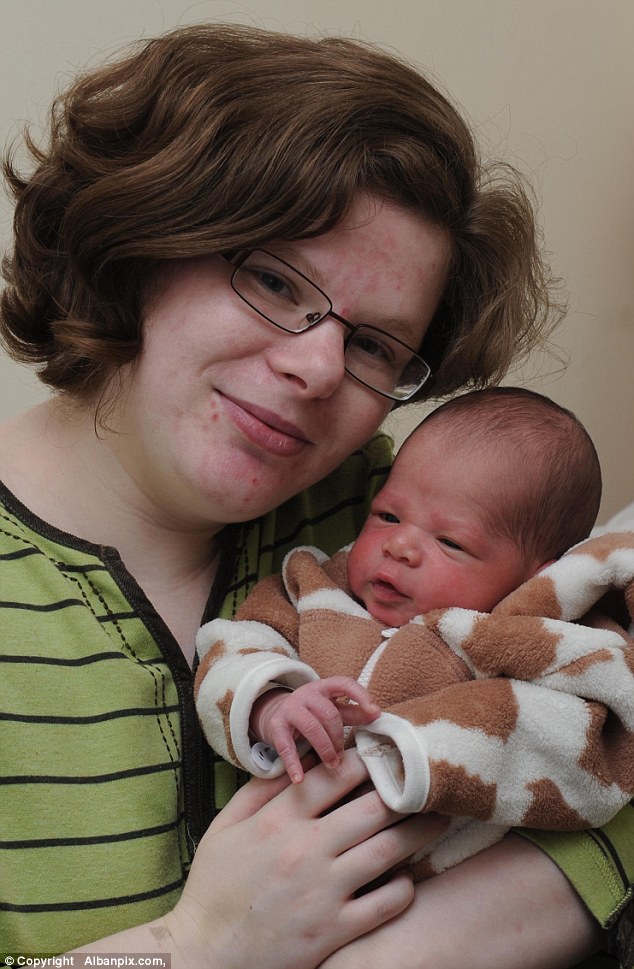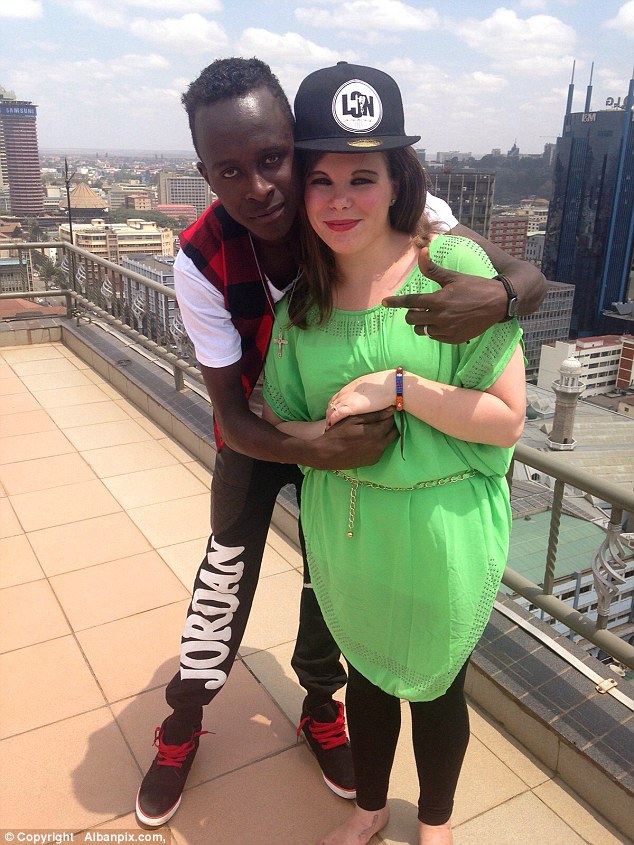‘My Maasai dream is over’: Theatre volunteer, 26,who moved to Kenya to marry a tribal warrior returns to Britain to give birth to a baby by his 19-year-old SON (who sees her ‘more like a mum’)
- Rebekah O’Brien moved to Kiserian, Kenya to marry a dancer Rempesa in 2013
- After their relationship ended Rebekah began seeing his son Lawrence, 19
- Last week she gave birth to Lawrence’s child, a boy called Kito
- The pair are no longer together but Rebekah has sent Lawrence £600
 Rebekah O’Brien moved to Kenya and married a Maasai warrior, but she has just had a baby with his son after they fell for each other. Pictured: Rebekah with her son Kito
Rebekah O’Brien moved to Kenya and married a Maasai warrior, but she has just had a baby with his son after they fell for each other. Pictured: Rebekah with her son Kito
A new mother has revealed how after she moved to Kenya to marry a Maasai warrior she went on to have a baby with his teenage son – who remains in Africa, while she is back in Britain.
Rebekah O’Brien, 26, fell for butcher Rempesa Ole Kirkoya, 40 when he and his Maasai warrior troupe came and performed in the Maddermarket Theatre in Norwich in 2012.
Rebekah, a gym receptionist from Kent, was so entranced with his culture and the connection that she felt that she uprooted her life to move 7,000 miles to be with him – even though he was already married to his wife Joyce.
But three years on and her fate has been less than straightforward. She and Rempesa are no longer together and instead she is romantically involved with his eldest son, a teenager still at school who is unable to help her support their week-old son Kito.
Rebekah O’Brien, 26, fell for butcher Rempesa Ole Kirkoya, 40 when he and his Maasai warrior troupe came and performed in the Maddermarket Theatre in Norwich in 2012.
Rebekah, a gym receptionist from Kent, was so entranced with his culture and the connection that she felt that she uprooted her life to move 7,000 miles to be with him – even though he was already married to his wife Joyce.
But three years on and her fate has been less than straightforward. She and Rempesa are no longer together and instead she is romantically involved with his eldest son, a teenager still at school who is unable to help her support their week-old son Kito.
Rebekah’s love affair with Kenya – and two of its citizens – began in October 2012 when she was on a filming course and volunteered as a steward at the Norwich theatre.
Rempesa and his Osiligi warrior troupe came to put on a performance of their songs and dances and she was so fascinated by them that when one of the women she met invited her to visit Kenya.
Then, as she waited for her friend by a shop, she ran into Rempesa, then 37, and even though he couldn’t speak a word of English and she knew no Swahili, they managed to converse with hand movements and facial expressions.
Rebekah recalled: ‘When my friend came out, she gave me a knowing look, and now, looking back, that was the moment I started falling for him.
She decided to go to Kenya for a nine week trip in January 2013. She flew out to stay in a tin hut in Kisamis Kiserian, an hour’s drive from Nairobi, where there was no running water or electricity.
It was there that Rebekah and Rempesa, the village butcher, started a relationship.
‘On that first trip I saw him a number of times, sometimes with his wife, and she would even translate for me so we could chat,’ she said.

After splitting with Rempesa Rebekah fell for his son Lawrence, 19, and she fell pregnant in august
‘I remember him saying “I love you” to me and at first I just saw it as friendly, but my feelings started to grow,’ she said.
‘As a Western woman in Kenya people were suspicious of me, but Rempesa was so kind, buying me food and drinks and always had time for me and made me feel welcome and special.’
Amazingly, when she first met him he already had a wife, Joyce, who welcomed her into the fold and gave their relationship her blessing.
As he spoke little English, Joyce helped translate for Rebekah so they could build their relationship and even played the Backstreet Boys hit As Long As You Love me so they could all sing along to make her feel at home.
Rebekah then came back to the UK in March 2013 and vowed to learn Swahili so she could return to Kenya, signing up for a course on Facebook.
Then she began chatting to Rempesa on Skype and he told her again that he loved her and missed her and it was then that she realised she wanted to be with him.
Although he was married with five children – a boy and four girls aged between five and 17 – he told her their relationship was platonic and his wife Joyce herself told Rebekah that she was happy for them to marry.
In March 2013 Rempesa returned to the UK to perform with his troupe, so they would talk on the phone up to four times a day and, on his last night here, their relationship became physical.
She said: ‘We shared a hotel room together and it was lovely. We talked about getting married and although he didn’t say his marriage was over, and I knew he still lived with his wife, I felt assured they were nothing more than friends.’
And it was Joyce, 42, who welcomed Rebekah at the airport when she went to visit again in December.
She recalled: ‘We drove back and she kept playing the Backstreet Boys in the car so we could sing along to make me feel at home. She said the song was all about love and that’s what we shared.
‘When I got to the house, Rempesa led me to his bedroom, and Joyce went and stayed with the children. It was strange, but I was just so happy to be with him and I realised then it wouldn’t be a case of him having two wives, although I was happy to live like that. I would be his main wife and they were just friends.”
Rebekah admits that she’d been unlucky in love in England and loved the different values held by Rempesa and his Kenyan friends, which was one of the reasons she has chosen to make a life for herself there.
She said: ‘My friends said I was mad to be running off with a Kenyan man, living in a tin hut with him and his first wife and five children.
‘But there is hardly a huge sea of great guys here in the UK. And I decided when I was there that I didn’t want to be like women here, working all the time
‘In Kenya, it’s like being a British wife in the 1940s. You cook, clean and look after the home and your husband and family and I don’t see anything wrong in that at all.
‘The whole community supports each other and everyone is so happy and friendly. They have a great life.’
In Rempesa’s culture, Rebekah became his wife when she spent a night in his home and they were set to have a wedding ceremony but had to abandon their plans after his first wife suddenly died.
But tragedy soon struck. In January 2014, as Rebekah settled into her new life, Joyce, died of an accidental overdose.
Rebekah said the other villagers blamed her tor the incident but despite threats she and Rempesa kept their relationship alive
She said: ‘It was a total shock but she was very troubled.’ She said that there had been animosity towards her from some of the people in the village who blamed Rebekah for getting together with Rempesa for Joyce’s death.
However, the pair still planned a proper ceremony where Rebekah would spend the night before the wedding with a village elder before being led to her dress. She hoped that with other traditional celebrations they would receive gifts from the villagers such as a chicken or a cow.
‘It’s not like a wedding in the UK where you spend a fortune on a big dress and have a list of expensive presents you’d like at John Lewis,’ she said.
In February 2015, she fell pregnant and returned to the UK to have her baby where it could be cared for by the NHS and have British citizenship.
I suppose it didn’t help that I was basically his stepmum before we got together
However, speaking at the time about her future as a mother, Rebekah revealed that she had lost the support of her family and was living with a Christian couple in Norwich while she tried to raise the money to go back to Kenya to live.
Speaking about being a new mum, she said: ‘I know that in Kenya, looking after a baby would be totally different. As the people there are poor, they only buy one nappy at a time, and I know that babies can go through about six a day, so I think at first I’d be better in the UK.
‘Once the baby is older, I think they adapt very well to being mothers. You go to cafes and see mums with their babies strapped across them, walking round, and they just get on with their lives.
‘The food is much healthier and less processed, just lots of fruit, veg and meat, and the weather is much better. I always feel healthier there and the community is very much focused on children and family.’
But the future that she sketched out for herself and Rempesa wasn’t to be. In the final months of her pregnancy, she and Rempesa broke up and Rebekah faced tragedy alone.
She gave birth to her daughter Arya who died just six weeks later. Rebekah then had to break the agonising news to Rempesa over Skype.
Although heartbroken and grieving, Rebekah craved Kenyan village life again and wanted to be back with Arya’s family.
But once she returned she herself falling for the warrior’s 19-year-old son Lawrence who is still at school making up for a few missed years through truancy.
He confessed his feelings for her and their relationship became physical.
Rebekah then fell pregnant with her son Kito last August, however it seems that the pressure of the pregnancy turned the relationship sour and Rebekah returned to the UK to have their son who was born last week.
She is hoping to see Lawrence come to the UK to visit his child and has already sent him £600 despite the fact he is unable to pay child support because he is still in school.
Rebekah told the Mirror: ‘I want Lawrence to be in his life, but I fear he sees me more as his mother than his girlfriend.
‘I suppose it didn’t help that I was basically his stepmum before we got together.’
daimawakenya@gmail.com
Read more: http://www.dailymail.co.uk/femail/article-3625926/Mother-moved-Kenya-marrying-Maasai-warrior-baby-SON.html#ixzz4AnRxrnGJ


 Rebekah O’Brien moved to Kenya and married a Maasai warrior, but she has just had a baby with his son after they fell for each other. Pictured: Rebekah with her son Kito
Rebekah O’Brien moved to Kenya and married a Maasai warrior, but she has just had a baby with his son after they fell for each other. Pictured: Rebekah with her son Kito
Recent Comments